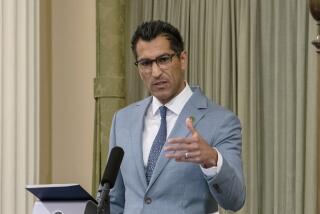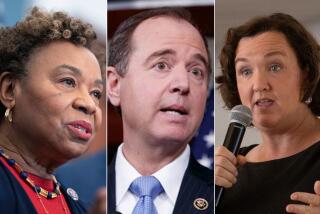Cheney Leads Charge Against Kerry on Taxes
- Share via
Vice President Dick Cheney took the lead in a coordinated Republican attack Monday, charging that John F. Kerry has voted “at least 350 times for higher taxes” during his Senate career. But the claim was disputed by nonpartisan watchdog groups as being based on an inaccurate interpretation of Kerry’s record.
Cheney, speaking before the U.S. Chamber of Commerce in Washington, called Kerry a “senator who will speak out against higher taxes when it suits the political moment but is one of the most reliable pro-tax votes in the United States Senate.”
In addition, a 60-second national radio ad launched Monday by the Bush campaign featured a Boston law enforcement officer declaring that the Massachusetts senator “likes to raise taxes. So much so he’s voted for higher taxes 350 times.”
Some independent organizations say the claim about Kerry’s 350 votes for tax increases is misleading.
The Bush campaign’s list of Kerry’s votes for “higher taxes” includes votes in which the senator voted to leave taxes unchanged, said Brooks Jackson, director of FactCheck.org, a private nonpartisan policy organization based in Washington.
The list also includes votes in which Kerry backed proposals to cut taxes, though not as much as Republicans advocated.
“Such a standard does not pass the straight-face test for credibility,” said Robert Bixby, executive director of the Concord Coalition, a nonpartisan budget watchdog group.
The attacks by the Bush campaign and Cheney appeared as part of a coordinated effort by Republicans to portray Kerry as a tax-and-spend liberal, and it’s a message voters will probably hear repeatedly in the months to come. The Bush campaign got the message underway earlier this month when it ran television ads in 18 battleground states claiming Kerry would raise taxes by $900 billion -- a figure based on Bush’s math about what Kerry might do, not Kerry’s previous statements.
President Bush, rallying supporters in Orlando earlier this month, said the Democratic candidate voted “over 350 times for higher taxes on the American people.” New polls suggest the overall line of attack on Kerry may be having an effect.
When 1,001 voters were asked in a CNN/USA Today/Gallup Poll conducted March 26-28 if they thought their taxes would go up in a Kerry administration, 58% said yes, and 27% said no.
Kerry disputed the tax label while campaigning in Sacramento on Monday. He told voters at the start of a town hall meeting that the Bush administration “found Dick Cheney in an undisclosed location and brought him out to attack me.... With each attack this administration is building up the truth deficit to go along with the jobs deficit and the fiscal deficit and their international intelligence-gathering credibility deficit,” he said.
Laura Tyson, former chairwoman of the President’s Council of Economic Advisors during the Clinton administration, called Cheney’s attack “absolutely, entirely misleading” in a conference call Monday arranged by the Kerry campaign. She said Kerry had supported a refundable child tax credit and a repeal of the inheritance tax for small-business owners, the middle class and farmers. The only thing he opposed, Tyson said, were tax cuts for those with average annual incomes of $200,000 or more.
The Bush campaign said it stands by its characterization of Kerry’s tax votes.
Kerry has indeed voted to raise taxes and has voted against tax cuts -- and the Bush campaign is in safe territory to point this out, said Bixby of the Concord Coalition. One of the most significant tax votes was Kerry’s support for the Clinton administration’s 1993 omnibus tax package.
But many of the votes counted in the Bush administration’s laundry list were votes to uphold budget enforcement rules, Bixby said. Such votes are “usually considered a responsible thing to do” and are not interpreted as votes in favor of higher taxes.
Bixby said that by his count, 40 of the 350 votes involved amendments to the 2001 Bush tax cut bill. He also counted more than 50 votes involving last year’s budget resolution and reconciliation tax cut bill.
What made Bixby, the Kerry campaign and FactCheck.org perhaps most incredulous was the inclusion of “votes in favor of higher taxes” instances in which Kerry actually voted for a tax cut -- just not the biggest tax cut proposed.
One example was found on page 83 of the Bush campaign’s 87-page listing of Kerry’s votes. Listed as “Senate Vote 167-S 1054,” the measure was the Senate Democrats’ substitute to counter Bush’s 2003 economic stimulus package. The Democratic plan, which Kerry voted for, and the Republican plan, which Kerry voted against, would have lowered taxes.
Why did it end up on a list of “votes for higher taxes”?
“If the choice is between a bigger cut and a smaller cut and John Kerry opposes the bigger tax cut and supports a smaller cut, the net result is that there is less of a tax cut for the American people. Therefore it’s a vote for higher taxes,” said Steve Schmidt, Bush-Cheney campaign spokesman.
“When John Kerry has had a choice between voting for a lower tax or a higher tax, he has consistently chosen to vote for the higher tax.”
The Bush campaign separates the more than 350 votes into six broad categories. One is “votes for tax increases.” One is “votes for watered-down, Democrat ‘tax cut’ substitutes.”
When pressed, the campaign provided a separate -- and much smaller -- list with the following headline: “Sen. Kerry Has Voted 98 Times For At Least $2.3 Trillion In Tax Increases.”
Kerry himself played a bit fast and loose with the facts Monday.
“The administration has one economic policy for America, 3 million jobs lost and driving gas prices toward $3 a gallon; that’s their policy,” he said in Sacramento. “And they are now running a campaign of untruths of misleading Americans. They are running a campaign in March of mid-October desperation.”
He was likely referring to a Bureau of Labor Statistics report that says the country lost 2.9 million jobs in the private sector during the Bush administration. But gas prices are nowhere near $3 a gallon, even in California, which boasts among the highest prices in the country.
The American Automobile Assn. says the average price for a gallon of self-serve unleaded gasoline has been rising -- to $1.72 per gallon nationally, $2.16 in California and $2.28 on average in the Bay Area, according to a March 16 news release.
*
Times staff researcher Susannah Rosenblatt contributed to this report.
More to Read
Get the L.A. Times Politics newsletter
Deeply reported insights into legislation, politics and policy from Sacramento, Washington and beyond. In your inbox twice per week.
You may occasionally receive promotional content from the Los Angeles Times.











